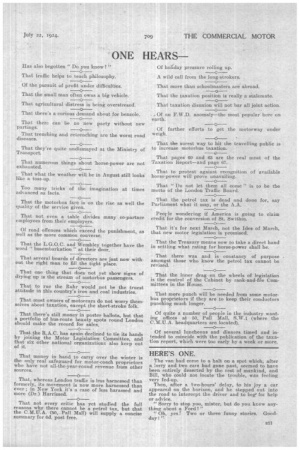ONE HEARS
Page 3

If you've noticed an error in this article please click here to report it so we can fix it.
Has also begotten " Do you know ? " That traffic helps to teach philosophy. Of the pursuit of profit under difficulties.
That the small man often owns a big vehicle.
That agricultural distress is being overstresed.
That there's a curious demand about for benzole.
That there can be no new party without new partings.
That trenching and retrenching are the worst road diseases.
That they're quite undismayed at the Ministry of Transport.
That numerous things about horse-power are not exhausted. 0 That what the weather will be in August still looks like a toss-up.
Too many tricks of the imagination at times advanced as facts.
That the motorbus fare is on the rise as well the quality of the service given.
That not even a table divides many co-partner employees from their employers.
Of road offences which exceed the punishment, as well as the more common converse.
That the L.G.O.C. and Wembley together have the word " busembarkation " at their door.
That several boards of directors are just now without the right man to fill the tight place.
That one thing that does not yet show signs of drying up is the stream of motorbus passengers.
That to rue the Ruhr would not be the truest attitude in this country's iron and coal industries.
That most owners of motorcars do not worry themselves about taxation, except the short-stroke folk.
That there's still money in poster ballots, but that a portfolio of bus-route beauty spots round London should make the record for sales.
That the R.A.C. has again declined to tie its hands by joining the Motor Legislation Committee, and that six other national organizations also keep out of it.
That money in hand to carry over the winter is the only real safeguard for motor-coach proprietors who have not all-the-year-round revenue from other sources.
That, whereas London traffic is less harnessed than formerly, its movement is now more harnessed than ever ; in New York it's a case of less harassed and more (Dr.) Harrissed.
That not every critic has yet studied the full reasons why there cannot be a petrol tax, but that the C.M.U.A. (50, Pall Mall) will Supply a concise summary for 6d. post free.
Of holiday pressure rolling up.
A wild call from the long-strokers.
That more than schoolmasters are abroad_
That the taxation position is really a stalemate.
That taxation disunion will not bar all joint action.
Of an F.W.D. anomaly—the most popular bore on earth.
Of further efforts to get the motorway under weigh,
That the surest way to hit the travelling public is to increase motorbus taxation.
That pages 60 and 63 are the real meat of the Taxation Report—and page 67.
That to protest against recognition of 'available horse-power will prove unavailing.
That " Do not let them all come " is to be the motto of the London Traffic Board.
That the petrol tax is dead and done for, say Parliament what it may, or the A.A.
People wondering if America is going to claim credit for the conversion of St. Swithin.
That it's for next March,. not the Ides of March, that new motor legislation rs. promised.
That the Treasury means now to take a direct hand in settling what rating for horse-power shall be.
That there was and is constancy of purpose amongst those who know the petrol tax cannot be revised.
That the inner drag on the wheels of legislation is the control of the Cabinet by rank-and-file Committees in the House.
That more punch will be needed from some motorbus proprietors if they are to keep their conductors punching much longer.
Of quite a number of people in the industry wanting offices at 50, Pall Mall, S.W.1 (where the C.M.U.A. headquarters are located).
Of several luncheons and dinners timed and intended to coincide with the publication of the taxation report, which were too early by a week or more.






























